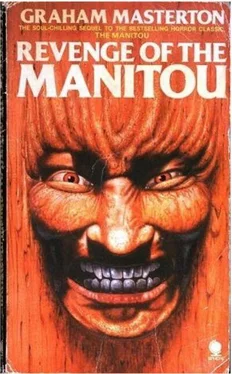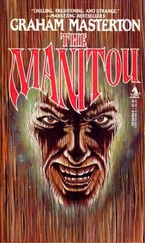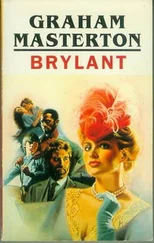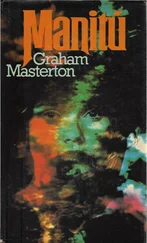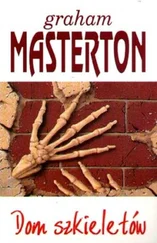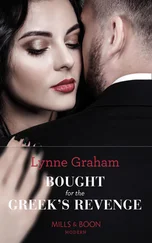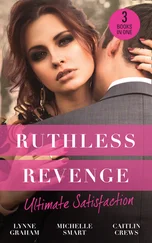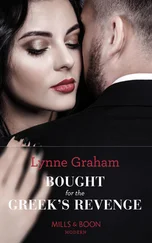The Petrified Forest itself was just below the brim of the mountains that sloped down to the town of Calistoga. Neil had always promised Toby that he would take him there to see the giant petrified redwoods, but it was one of those trips that they’d never gotten around to taking. He drove past the wooden gates of the entrance with his pickup blowing out blue smoke.
In Calistoga’s main street, a sleepy one-horse thoroughfare at the head of Napa Valley, Neil parked the pickup in the shade of an old flat-fronted hotel building and climbed out. It was way up in the high eighties, and he wiped his forehead on his shirt sleeve. Beyond the main street, there were only the dark-green, forested mountains, and the air was heavy with the scent of the trees. The sky was cloudless and inky blue.
He walked along the street until he found a drugstore. Inside, it was air-conditioned and smelled of menthol. He went up to the prescription counter and waited while the short, bespectacled druggist wrote the label for a large bottle of stomach pills.
“Can I help you?” the druggist asked bun. His spectacles had such strong lenses that his eyes were hugely magnified.
“I’m looking for an old man named Billy Ritchie,” said Neil. “I guessed, since he was old, he might come in here for prescriptions.”
The druggist finished off his label. “Sure. I know Billy Ritchie. I’d like to know someone in town who doesn’t. A real old character. Where are you from?”
“Out by Bodega Bay. I met a friend of his, an old sailor, and the sailor said I ought to drop by and see Billy if I was passing.”
The druggist nodded. “Sure. If you cross the street here, and take the first on your right, that’s Washington Street, then take the fifth right again, that’s Lake Street, you’ll find Billy in the green-painted house on the left. You can’t miss it, his name’s on the mailbox.
“Thanks.”
Neil left the store and crossed Lincoln Avenue in the shadowless midday heat. He walked as far as Lake Street, sweating and short of breath, and the house was right there. A small clapboard cabin, painted the color of lawn mowers. It was shaded by maples and firs and looked deserted. Neil went up to the door and knocked.
It took a long time, but after a while he heard a clattering sound inside, and the security chain was drawn back. The door opened, and in the dun hallway, Neil saw a wizened old man in an invalid chair.
“Are you Billy Ritchie?” he asked, quite loudly, in case the old man was deaf.
“That’s me, sir. What do you want?”
“I’m afraid it’s kind of hard to tell you in one breath. But I was talking to Doughty out on the jetty at Bodega Bay, and he said I should come see you. He said you could tell me some stories of the old days.”
The old man nodded. He was bald, smooth-shaven, and toothless, and the only hairy thing about him was the black chinchilla cat which sat in his lap, and which he endlessly stroked.
“I can tell you stories, sure. What stories do you want to know?”
“I’d like to know about the Fenners, back in the days of the Wappo Indians, if that’s convenient.”
Billy Ritchie coughed. “Those were bad days. What do you want to know about them for?”
“A couple of reasons. For one, my name’s Neil Fenner.”
The old man laughed, and coughed some more.
“Sounds like as good a reason as any. Tell you what, I’ll strike you a bargain. Get yourself back down the road there and bring me a six-pack of Coors and a pint of Old Crow, and that’s all I ask in return. I can’t tell stories on a dry whistle.”
“You’ve got yourself a deal.”
Ten minutes later, his hair dripping with sweat and his shirt soaked, Neil came back with the liquor. The old man had left the front door ajar, and as Neil walked up the path, the host called, “Walk straight in there, friend. Close it behind you, though. You never know who might come prowling to steal my valuables.”
The little house was dark and cool, and surprisingly clean and well cared-for. Billy Ritchie, without his legs, had made his home his whole world, and it was wallpapered from floor to ceiling with color pictures cut from calendars and magazines. Every room was a patchwork of scenic views snipped from tourist brochures, close-ups of butterflies and flowers, religious scenes and snow scenes, cartoons and classic works of art, all interleaved with center spreads from Penthouse and Hustler.
“Most folks comment on every damn picture except the girls,” said Billy Ritchie. “But what I say is, if an old gent can’t admire some young flesh when he’s past everything but spitting contests, then it’s a sad world.”
The old man was sitting in a shadowy corner of the room, his head silhouetted by the light from the half-closed Venetian blinds behind him. Through the slats of the blind, Neil could see a tangled garden, overgrown with wild grass.
“There’s glasses on the side there,” Billy Ritchie said. ‘Tour me a beer and a stiff one, and whatever you want for yourself.”
Neil went across to a low sideboard with a decorated glass front and laid out three glasses. He opened a beer for each of them, and poured out three fingers of bourbon for Billy Ritchie. Then he sat himself down in an uncomfortable, yellow-painted, basketwork chair, lifted his drink, and said; “Good health, Mr. Ritchie.”
The old man raised his glass in return. “Same to you. But call me Billy, and don’t worry too much’ about my health. I lost the use of my legs twenty years ago when I fell off a damn bad-tempered horse, and I’ve been fit as a damn drum ever since. I’ve seen a lot, though, and talked to a whole host of the old-timers, and there isn’t much that’s passed me by.”
“What do you know about Bloody Fenner? That’s what they called him, didn’t they?”
“Oh, they sure did,” said Billy. “Bloody by name and damn bloody by nature. But you have to judge a man like that by the days he lived in, and those days in the Napa Valley weren’t easy. This was fine land, and the Indians weren’t too happy about handing it over. If you wanted to survive, you had to be real tough, and ready to make the best of things. That was what Bloody Fenner was good at. Making the best of things.”
Neil swallowed beer and wiped his mouth with the back of bis hand. “I heard he was a traitor, of sorts.”
Billy Ritchie pulled a face. “Not to himself, he wasn’t. He did pretty well in the 1830s, made himself a fair pile of money, and owned a whole stretch of good land up along the Silverado Trail. Trouble was, the Fenner family lost most of their acreage in the late forties, after the year of the Bear Flag Party across at Sonoma, when the Californians declared independence from the Mexicans. Fenner had gotten along good with the Mexicans, on account of he was smart and wily, and willing to perform a service to any man who paid him.
But when the Bear Flag folks took over, they made life so damn difficult for the Fenner family they sold out and moved to the coast, and I guess the land they bought was where you’re living now.”
Neil nodded. “Part of it, anyway. My grandfather sold about a hundred acres during the Depression.”
Old Billy Ritchie took a mouthful of Old Crow, coughed, and said, “A lot of folks did, especially around Napa. First, prohibition hit the wineries, then the Depression. They weren’t good times.”
“But what about Bloody Fenner?” asked Neil.
“Bloody Fenner?” echoed Billy Ritchie. “Bloody Fenner was the best damn brawler and fighter this side of the Sacramento River. He knew all the Indians by name, the Wappos and the Patwins, and there were plenty who said that he’d been initiated in a Wappo temescal. The stories say that he was a tall man, with a face as fierce as a bear, and that he could shoot a fly off of a horse’s ass if he was blindfolded and standing on his head.”
Читать дальше
